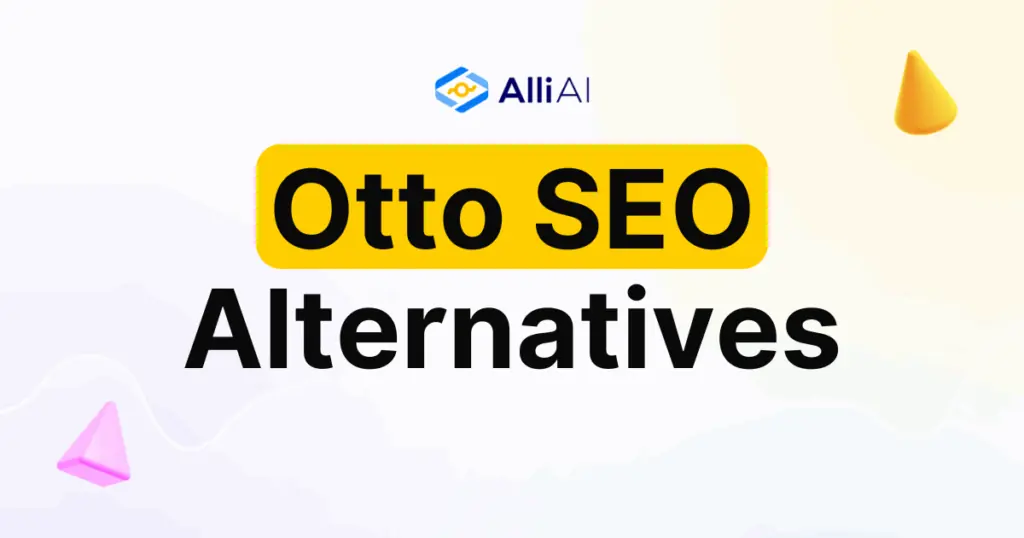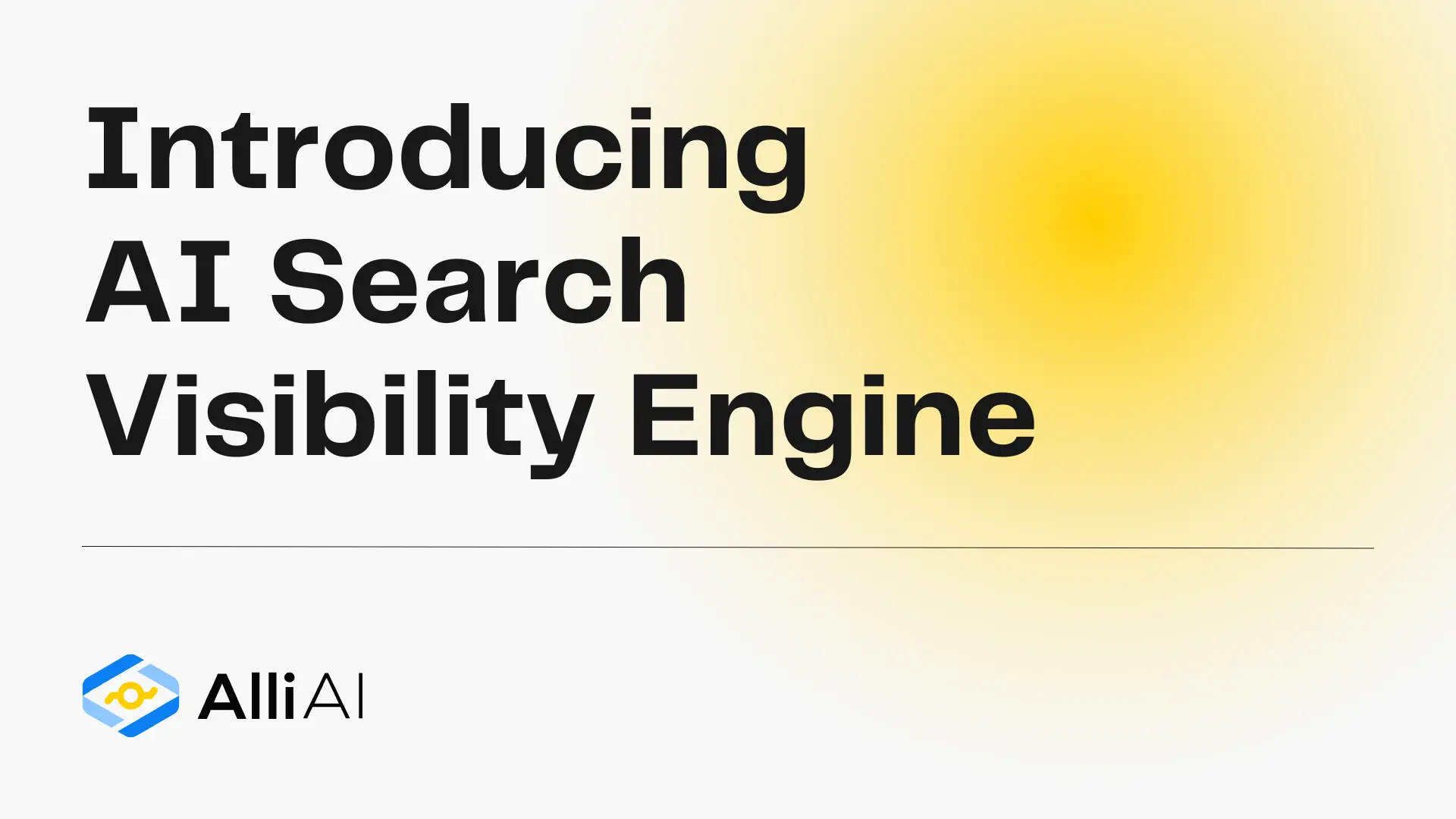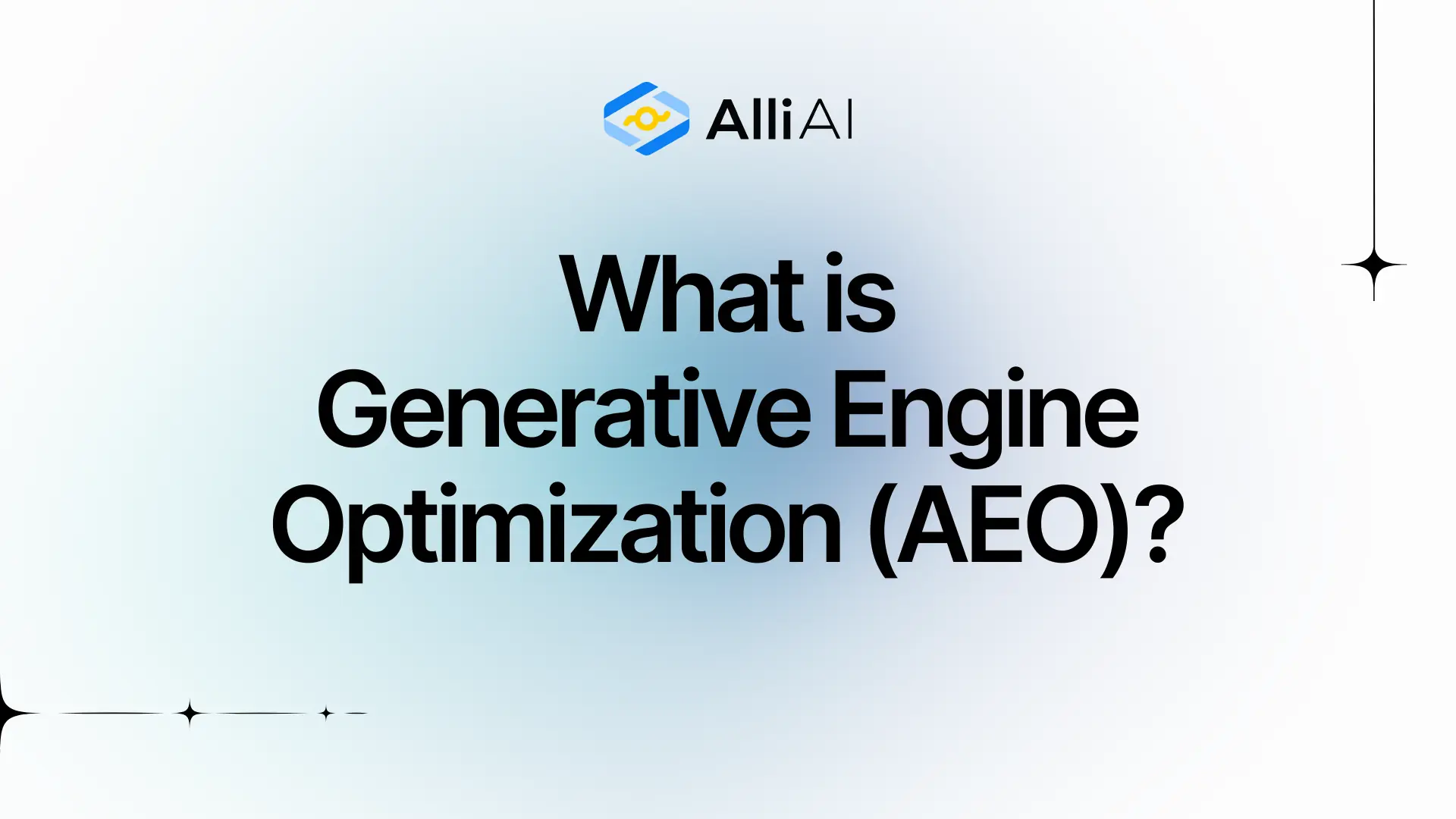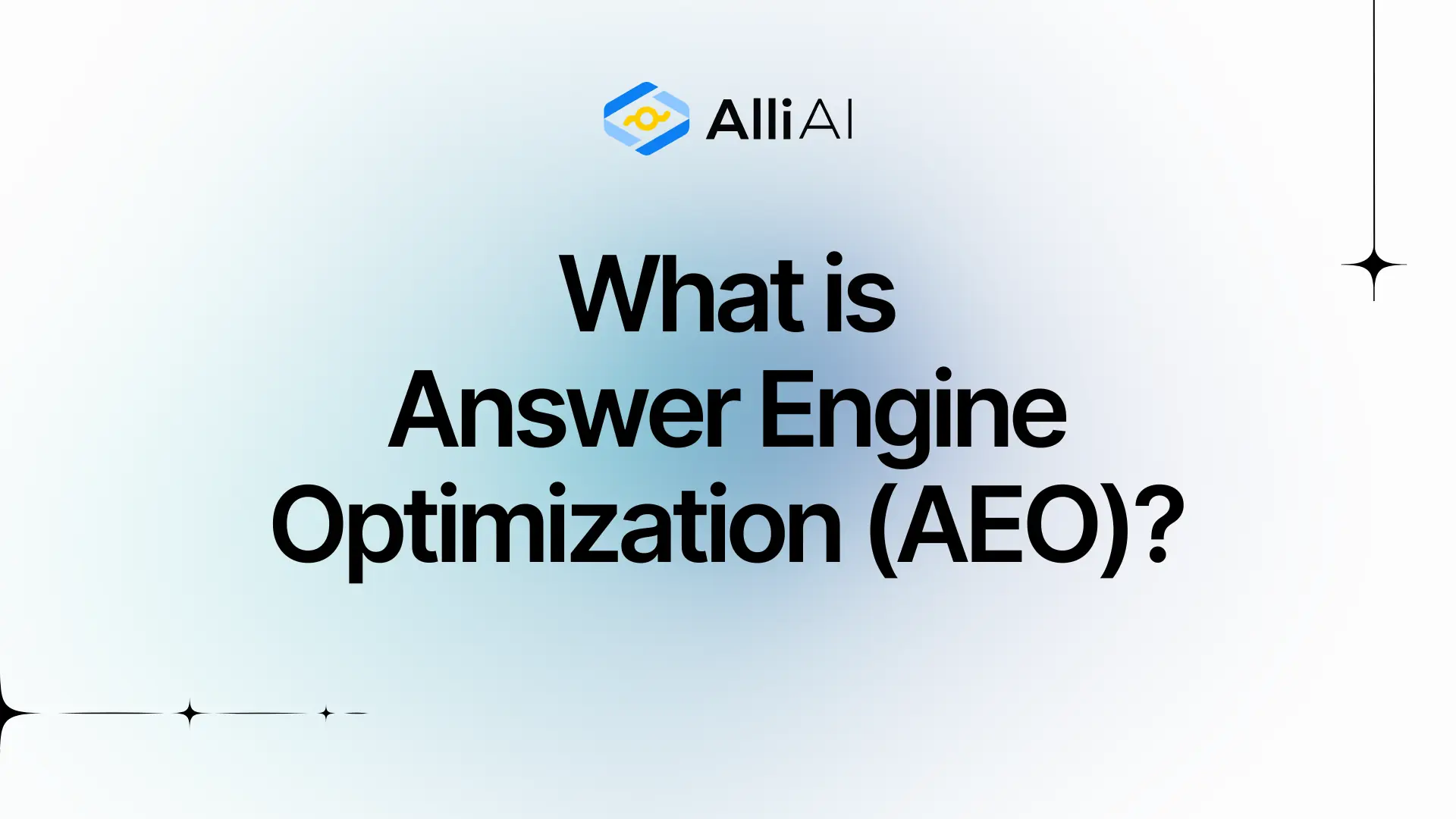OTTO SEO promises revolutionary AI-driven automation that deploys optimizations directly to websites. However, many changes revert when the JavaScript pixel is removed, creating subscription dependency that has driven SEO professionals to seek alternatives offering permanent improvements. This comprehensive analysis examines 18 alternatives across pricing tiers from free to enterprise, highlighting what each offers for implementation, automation, and AI search visibility.
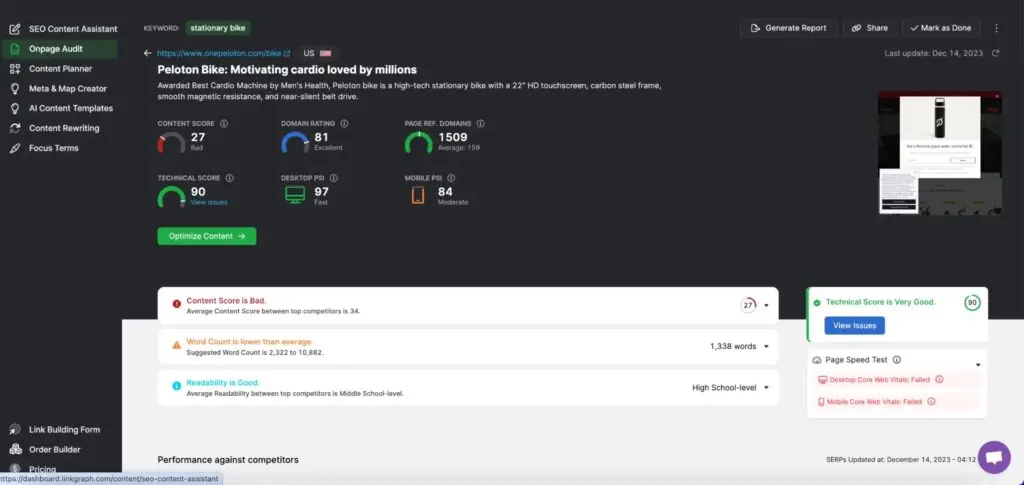
Understanding what you’re replacing
OTTO SEO by Search Atlas represents a JavaScript based implementation approach that makes real-time changes to websites via a lightweight pixel. The platform automates title tags, meta descriptions, schema markup, internal linking, content creation, and local SEO management. At $99-399 per month with add-ons, it targets agencies and mid-market businesses. User reviews show polarization: G2 ratings of 4.8/5 (91 reviews) contrast sharply with concerning Trustpilot feedback citing reliability issues, poor support, and the critical subscription dependency problem. When agencies cancel, many optimizations vanish unless manually exported and implemented—a reality that fundamentally undermines the “permanent improvement” promise of SEO.
The alternatives below span four categories: enterprise all-in-one platforms, content optimization specialists, technical SEO tools, and emerging AI-powered solutions. Each offers different trade-offs between automation, permanence, cost, and feature depth.
Enterprise all-in-one platforms: Analysis powerhouses without implementation
1. Alli AI: Premium SEO Automation With AI Search Visibility Engine
While OTTO SEO focuses exclusively on traditional search optimization, Alli AI delivers comprehensive automation with a critical advantage: the AI Search Visibility Engine that makes sites discoverable to ChatGPT, Claude, and Perplexity—addressing the fastest-growing search channel competitors ignore.
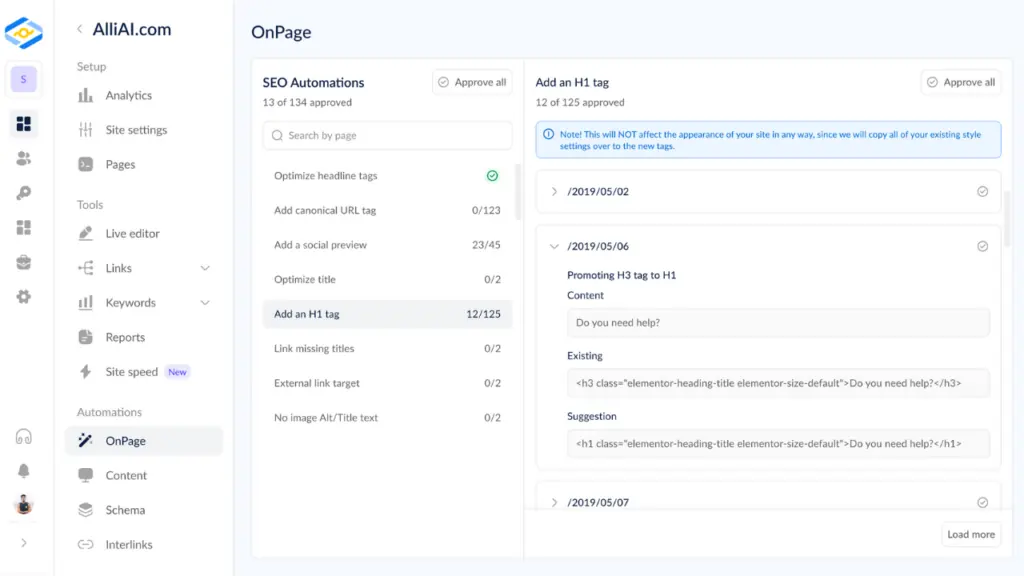
The AI Search Visibility Advantage
Most modern websites use JavaScript frameworks (React, Vue, Angular) that AI crawlers cannot parse. When ChatGPT, Claude, or Perplexity attempt to read these sites, they encounter blank pages. Alli AI’s Visibility Engine solves this technical challenge, ensuring your content remains discoverable as search behavior shifts toward conversational AI interfaces.
While OTTO offers LLM tracking as an add-on—passive monitoring of existing mentions—Alli AI proactively optimizes sites for AI search discoverability. This forward-looking positioning addresses the reality that 40% of Gen Z now prefers ChatGPT over Google for search, and AI Overviews increasingly dominate SERPs.
Enterprise-Grade Automation At Scale
Starting at $249/month (Consultant: 10 sites, 1,000 keywords, 2,500 pages) versus OTTO’s $99-399/month, Alli AI provides transparent pricing without hidden costs. Scale to $499/month (Agency: 25 sites, 2,500 keywords, 7,500 pages) or $999/month (Enterprise: unlimited sites, 10,000 keywords, 25,000 pages).
Deploy meta tags, schema markup, and content updates across thousands of pages instantly through encrypted code snippet integration working across any CMS—WordPress, Shopify, Wix, PrestaShop, or custom builds. The browser-based live editor enables direct on-page modifications deploying in seconds, eliminating developer bottlenecks entirely.
Create site-wide optimization rules and deploy code changes to individual pages with one button click. Bypass CMS limitations and technical dependencies while maintaining complete control—approve, edit, or un-approve any recommendation from the dashboard with changes going live immediately.
Performance That Drives Results
“Some of our keywords have moved 60 places, all generic. We have page one rankings,” reports one agency client. Another highlights ROI: “Most important it has help us save 75% of our PPC budget (thousands a month) for a better and more effective organic traffic.”
Page load time reductions up to 80% through server-side rendering and asset optimization improve both traditional SEO and user experience simultaneously. Automated A/B testing continuously analyzes user behavior to refine page titles, ensuring they outperform competition for maximum visibility. Schema automation deploys perfectly implemented structured data without requiring JSON-LD expertise.
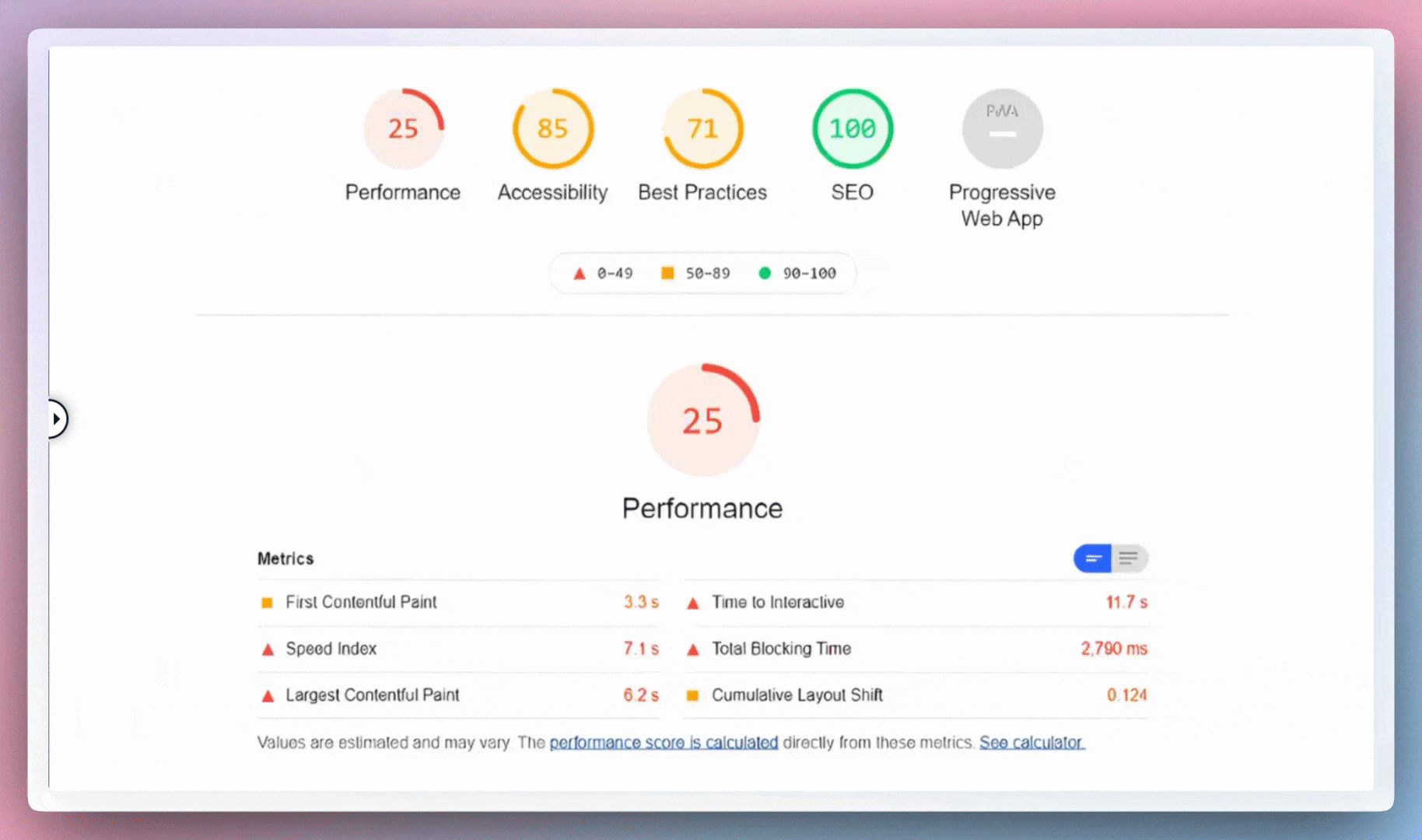
Why Agencies Choose Alli AI
“I manage all my clients with Alli AI. There’s simply no faster way to optimize a website. We’ve gone from taking months to get tasks done manually to seeing the changes live instantly. Alli AI automates thousands of hours of manual work in minutes, and you can do it all from one dashboard without having to learn and train staff for different CMS for every client.”
The platform enables agencies to manage 3x more clients with existing staff while improving margins through automation. One optimization rule updates thousands of pages across entire client portfolios simultaneously—portfolio-wide power that transforms agency economics.
Regular site scans detect content changes and update automations automatically. The highlight tool provides complete visibility into which optimizations are live on every page. Internal linking intelligence streamlines site architecture with AI-driven suggestions at your fingertips, helping visitors discover information while spending more time on your site.
Comparison: Alli AI vs OTTO SEO
| Factor | OTTO SEO | Alli AI |
| AI Search Visibility | Tracking only (add-on) | Visibility Engine (included) |
| Starting Price | $99/month | $249/month |
| CMS Compatibility | Limited platforms | Universal – any CMS |
| Bulk Deployment | Thousands of pages | Up to 25,000 pages (Enterprise) |
| Page Speed Optimization | Minimal | Up to 80% reduction |
| Reliability | User reports vary | Stable enterprise infrastructure |
| Schema Automation | Included | Automated deployment |
| A/B Testing | Limited | Continuous automated testing |
Technical Implementation
Alli AI works through an encrypted code snippet installed on your website, enabling instant optimization deployment without FTP, SSH, or backend access. The platform provides comprehensive CSV reports detailing every change with exact HTML and CSS path codes, ensuring complete transparency and portability of your optimizations.
Best for: Agencies managing 10-25+ client websites seeking comprehensive automation with AI search positioning, teams requiring CMS-agnostic deployment, businesses preparing for AI-driven discovery channels, organizations prioritizing page speed and user experience
Key Features:
- AI Search Visibility Engine for ChatGPT, Claude, Perplexity
- Bulk optimization across unlimited pages and sites
- Up to 80% page speed improvements
- Automated schema markup and A/B testing
- Browser-based live editor for instant deployment
- Internal linking intelligence
- Real-time rank tracking up to 10,000 keywords
Pricing: Clear tiers $249-999/month with explicit site/keyword/page limits. 10-day free trial. No hidden fees or credit systems.
Strategic Advantage: While OTTO optimizes for yesterday’s search landscape, Alli AI positions for the AI-first future. When ChatGPT processes 2.5 billion prompts daily and AI Overviews dominate Google results, sites invisible to LLMs risk losing discoverability regardless of traditional rankings. Alli AI’s AI Search Visibility Engine addresses this strategic imperative competitors ignore.
2. Semrush: The comprehensive marketing suite
Semrush dominates as the most feature-rich alternative, though it stops short of OTTO’s direct implementation. With 24.3 billion keywords, 43 trillion backlinks, and integration of SEO, PPC, content, and social tools, Semrush serves agencies managing holistic digital strategies. The platform provides recommendations across technical SEO, content optimization, and competitive intelligence, but requires manual implementation or developer resources.
Pricing starts at $139.95/month (Pro) rising to $499.95/month (Business), making it more expensive than OTTO while offering broader capabilities. The Guru plan at $249.95/month includes content marketing tools and historical data valuable for agencies. G2 ratings of 4.5/5 (2,800+ reviews) and Capterra’s 4.7/5 (2,300+ reviews) reflect strong satisfaction, though users note the steeper learning curve and cluttered interface. Daily rank tracking updates and superior keyword database size differentiate Semrush from competitors.
For AI search visibility, Semrush offers an $99/month add-on tracking ChatGPT, Google AI Overviews, and Perplexity mentions—matching OTTO’s emerging capabilities. The key differentiator: All changes are permanent once implemented, eliminating subscription dependency risk. Agencies handling multiple marketing channels beyond SEO find Semrush irreplaceable, while pure SEO specialists may find better value elsewhere.
Best for: Large agencies managing SEO + PPC + content + social for enterprise clients
Implementation: Analysis and recommendations only; changes are permanent once applied
Automation: Automated reporting and crawls; no direct site changes
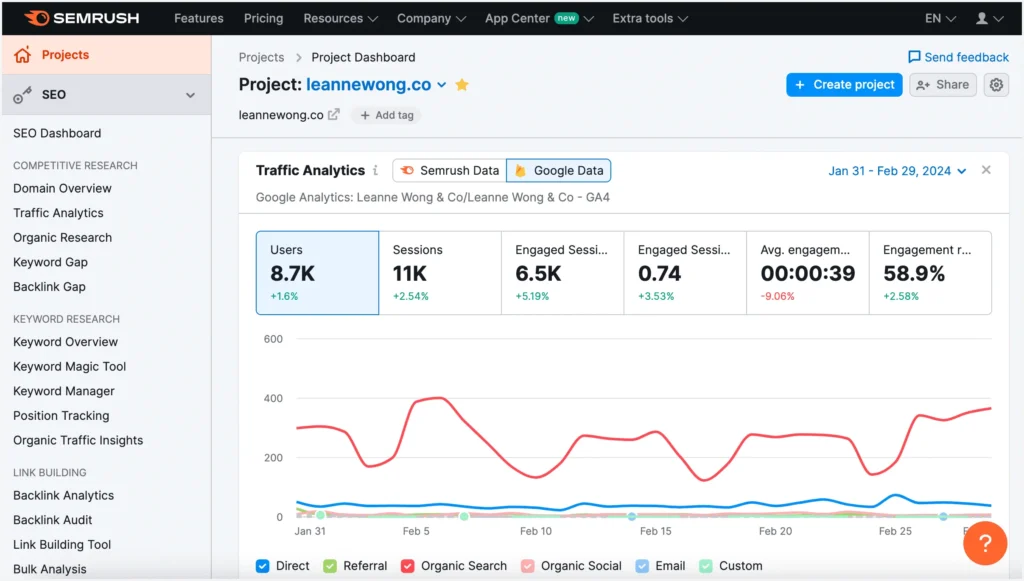
3. Ahrefs: Backlink analysis champion with credit frustrations
Ahrefs built its reputation on 35 trillion backlinks updated every 15 minutes—the largest and freshest index available. As the #2 web crawler globally after Google, Ahrefs excels at competitive backlink analysis, but recent pricing changes sparked user backlash. The controversial credit-based system introduced in 2022 depletes quickly even with moderate usage, transforming what seemed like unlimited access into a pay-per-action model.
Starting at $129/month (Lite) to $449/month (Advanced), Ahrefs costs similarly to Semrush while focusing primarily on SEO. The Standard plan at $249/month offers unlimited credits but remains expensive for smaller agencies. G2 ratings of 4.5/5 (560+ reviews) contrast with increasingly negative Reddit sentiment criticizing both pricing and perceived stagnation. Historical ranking data back to 2015 and superior traffic estimation accuracy remain strengths.
The new Brand Radar AI feature (currently free beta, moving to $99/month) tracks brand mentions in ChatGPT, Google AI Overviews, and Perplexity, though users report the UI needs refinement. The “Patches” feature introduced in 2024 allows creating fixes in Site Audit, moving slightly toward implementation, but still requires manual application. Ahrefs shines for link-building focused agencies but disappoints those seeking automation or all-in-one functionality.
Best for: Agencies prioritizing backlink analysis and link-building campaigns
Implementation: Primarily analysis; Patches feature creates fixes but manual implementation required
Automation: Automated crawls and IndexNow submission; limited compared to OTTO
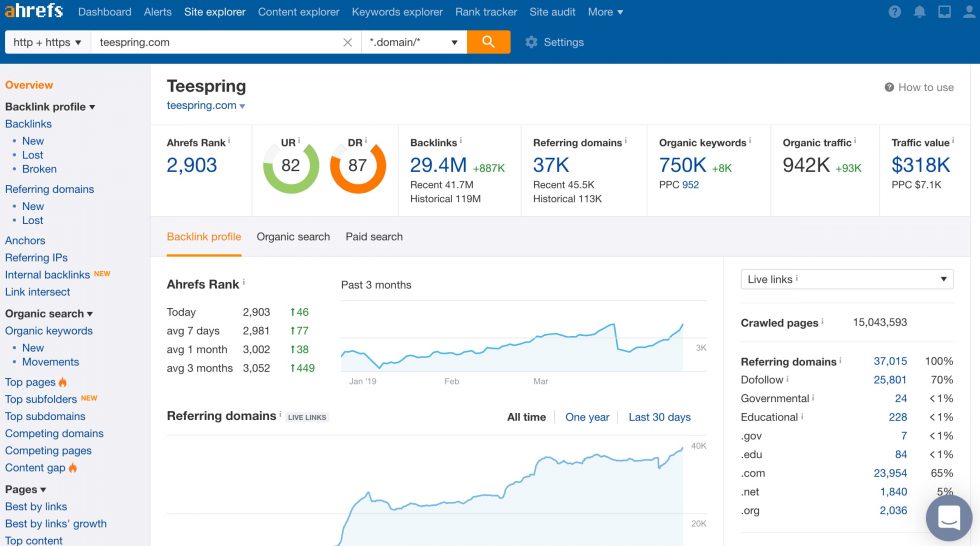
4. SE Ranking: Best value for budget-conscious agencies
SE Ranking delivers remarkable value at $65/month (Essential) to $599/month (Business), offering features that match or exceed competitors at half the price. The platform combines keyword research (5.3 billion keywords), technical audits (up to 15 million pages), daily rank tracking, content optimization, and white-label reporting in plans starting at $52/month annually. Highest ratings among enterprise tools at 4.8/5 on G2 (1,380+ reviews) validate the value proposition.
The game-changer for agencies: Agency Pack add-on at just $50/month includes unlimited white-label reports, 10 client seats, and lead generation widget—features costing hundreds more with competitors. Plans include 3-5 manager seats standard (versus per-user fees elsewhere), and you can track up to 15,000 keywords versus Semrush’s 5,000 maximum. Daily rank tracking across all tiers matches premium competitors.
For AI visibility, SE Ranking includes comprehensive 3-part AI tracking at no extra cost: AI Overviews Tracker, AI Mode Tracker, and unified visibility across ChatGPT, Perplexity, and Gemini. This feature alone costs $99/month extra with Semrush and Ahrefs. However, data accuracy concerns emerge in Reddit discussions, with users reporting discrepancies versus Google Search Console. The interface, while modern, requires learning time to master the extensive feature set.
Best for: Small-medium agencies (5-20 clients) maximizing features per dollar
Implementation: Analysis and recommendations; Content Editor generates content but manual publishing required
Automation: Automated reports, daily tracking, API access; no direct site implementation

5. Moz Pro: Beginner-friendly but feature-limited
Moz Pro represents the most accessible entry point at $49/month (Starter) to $299/month (Large), with annual pricing dropping to $39-239/month. The 30-day free trial (longest in category) and supremely intuitive interface make Moz ideal for beginners, but the platform shows its age when compared to modern alternatives. Weekly rank tracking updates versus daily from competitors represents a significant limitation for agencies needing real-time data.
The smallest keyword database at 1.25 billion (versus Semrush’s 26.4 billion) and restrictive reporting caps even on expensive plans frustrate power users. Moz’s Standard plan at $99/month provides basic features that free versions of competitors match or exceed. G2 ratings of 4.4/5 (567 reviews)—lowest among the four major platforms—reflect these limitations. Domain Authority and Page Authority remain industry-standard metrics, and the new Brand Authority score targets Google’s E-E-A-T algorithm updates.
For AI search, Moz now tracks keywords appearing in Google AI Overviews but lacks broader LLM tracking of ChatGPT or Perplexity. The focus on readability analysis and content quality appeals to editorial teams over pure SEO optimization. Moz’s value proposition centers on education—Premium includes Yoast SEO Academy courses—but agencies outgrow it quickly as client rosters expand.
Best for: Freelancers and small businesses learning SEO; educational content creators
Implementation: Analysis only; recommendations remain permanently once applied
Automation: Scheduled reports and weekly crawls; limited compared to competitors
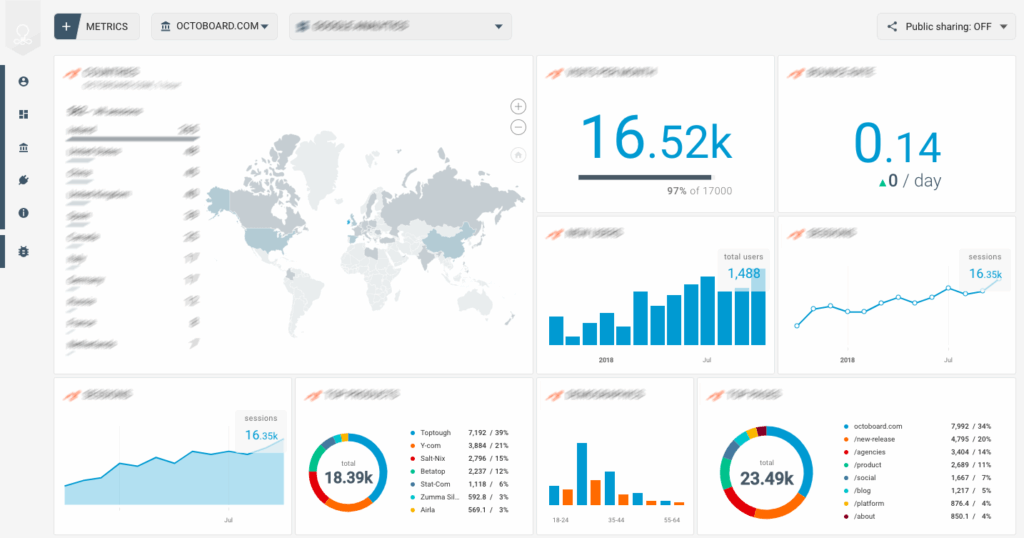
Content optimization platforms: Data-driven writing without automation
6. Surfer SEO: Feature leader with premium pricing
Surfer SEO built a dominant position in content optimization through 26% correlation with actual rankings (versus Clearscope’s 17.5% per Originality.ai study) and comprehensive feature depth. The platform analyzes 500+ on-page signals from top-ranking pages, providing real-time content scoring, NLP term optimization, and automated internal linking suggestions. At $89-299/month, Surfer costs less than OTTO while focusing purely on content performance.
The Essential plan at $89/month includes 30 articles, 2 users, and 2 sites—adequate for small agencies. The Scale plan at $129/month (100 articles, 5 users) hits the sweet spot for growing teams. However, Surfer AI article generation costs $29 per article additional, and core features like Content Audit ($49/month) and White Label ($49/month) require add-ons that push monthly costs toward $200-300. G2 ratings of 4.8/5 reflect satisfaction, but Reddit criticizes “bait-and-switch” pricing and AI content requiring heavy editing.
Surfer’s AI Tracker monitors brand visibility in ChatGPT, Gemini, and Google AI Overviews—a first-to-market feature targeting the AI search era. Content Planner generates keyword clusters and topical maps for strategic planning. The real-time Content Editor with detailed breakdowns saves hours versus manual SERP analysis. Critical limitation: Surfer provides recommendations only; writers must implement changes manually. Integration with Google Docs, WordPress, and Jasper streamlines workflows.
Best for: Medium to large agencies producing 50+ optimized articles monthly
Implementation: Recommendations only; no automatic deployment
Automation: Auto-optimize feature, automated crawls, but human writing/editing required
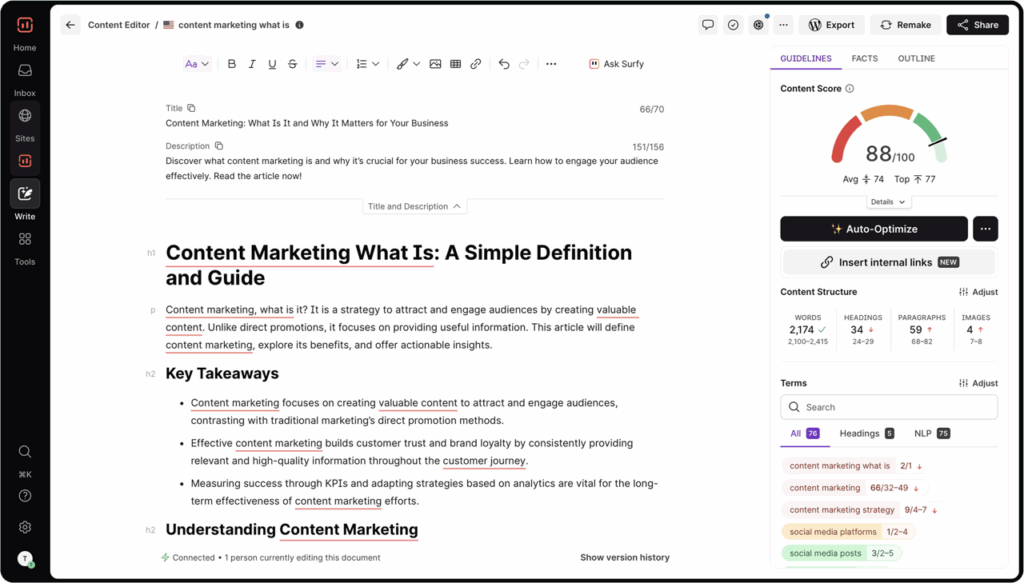
7. Clearscope: Simplicity and intuitiveness at enterprise prices
Clearscope wins the user experience battle with G2 Ease of Use rating of 9.6/10—highest in category—and 4.9/5 stars overall. The clean interface and letter-grade content scoring (A-F) make optimization accessible to editorial teams without SEO backgrounds. IBM Watson-powered semantic analysis and unlimited user seats on all plans differentiate Clearscope from competitors. However, pricing starts at $189/month (Essentials) rising to $399/month (Business), making it the most expensive content optimization platform.
The Essentials plan includes 20 monthly content reports, 50 content inventory pages, 50 keyword discoveries, and 20 AI-generated outlines (not full articles). Business plan adds dedicated account manager and 300 inventory pages. No free trial—only demos—and no money-back guarantee require significant commitment before testing. The letter-grade system simplifies optimization, but fewer features than Surfer SEO at higher prices frustrate value-conscious agencies.
Clearscope tracks brand visibility in ChatGPT, Gemini, and AI citations, supporting Generative Engine Optimization (GEO). Case studies show 52% traffic increases and 83.7% click improvements, though results vary. The platform’s search intent summaries with clear categorization and local SEO targeting add sophistication. Critical weakness: Only 5 languages supported versus Surfer’s 15+, limiting international SEO capabilities. Google Docs integration receives universal praise.
Best for: Enterprise content teams with budget prioritizing simplicity over feature depth
Implementation: Recommendations only; manual application required
Automation: Limited—focuses on empowering writers versus replacing them
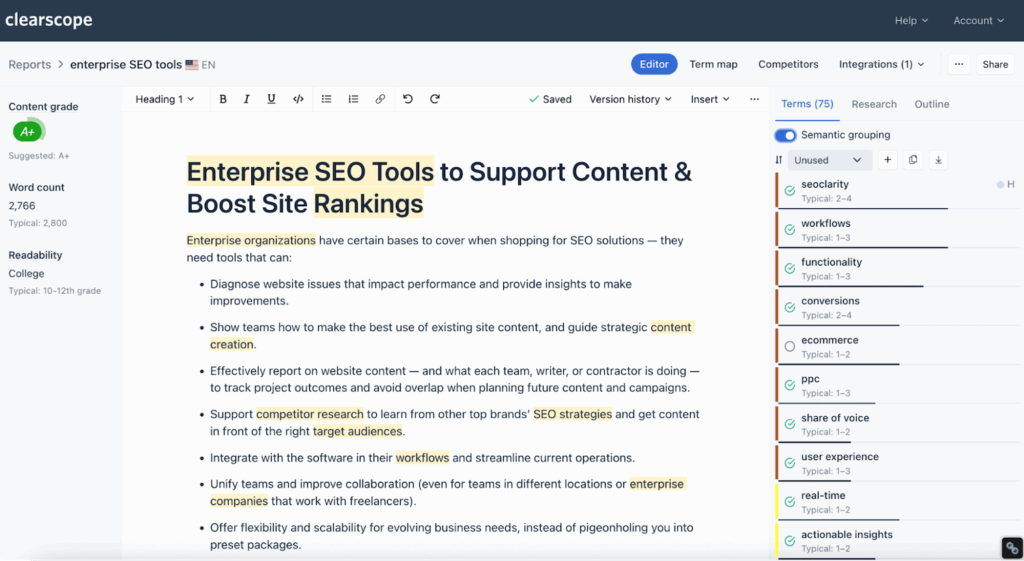
8. MarketMuse: Strategic depth for enterprises
MarketMuse differentiates through patented AI technology (U.S. Patent No. 10,134,997) that analyzes thousands of pages versus competitors’ 20-30 results. This creates topic models independent of current SERP results, building “expert models” of comprehensive coverage. Personalized difficulty scores based on YOUR site’s authority—not generic metrics—help agencies prioritize realistically achievable opportunities. G2 ratings of 4.6/5 reflect power but complexity, with users calling it the “Rolls-Royce of content optimization.”
Pricing reflects premium positioning at $99/month (Optimize) to $499/month (Strategy), with Enterprise plans reaching $1,499+/month. The credit system adds complexity and cost: Content Briefs cost $25 each, First Draft AI articles cost $75 each. The Free plan offers 10 queries monthly for testing. Research plan at $249/month includes unlimited queries but limits AI briefs to 10/month. These costs accumulate quickly for agencies producing content at scale.
MarketMuse excels at content strategy and topical authority building over tactical optimization. The Content Inventory analyzes entire sites, identifying gaps systematically. Site heatmaps visualize coverage across topics, helping enterprises plan long-term strategies. Questions generator provides superior research versus competitors. Learning curve intimidates beginners—multiple applications require toggling, and processing times can be slow. Target word counts often reach unrealistically high levels.
Best for: Enterprises with significant budgets planning comprehensive content strategies
Implementation: Analysis only; First Draft generates content but requires editing and publishing
Automation: AI briefs and drafts; manual strategy execution required
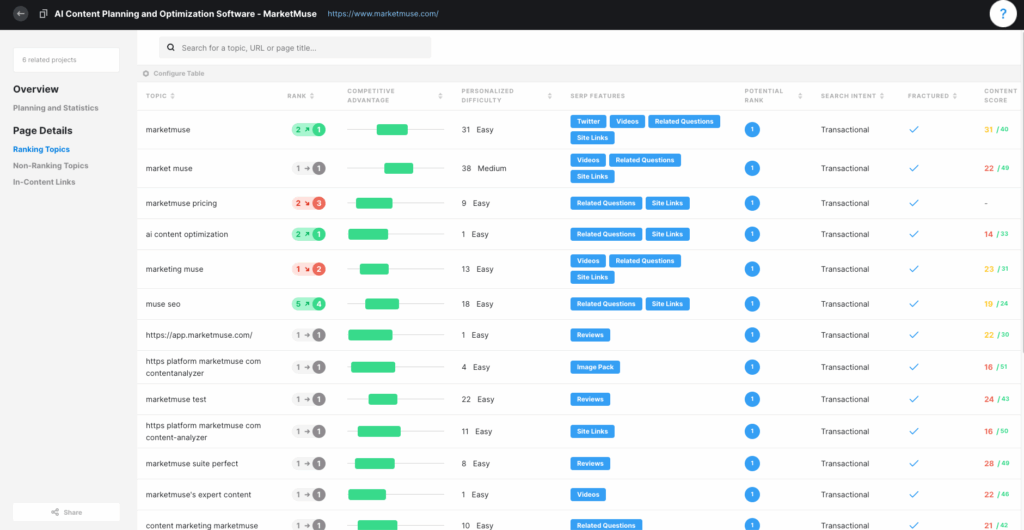
9. Frase: Maximum value for solopreneurs
Frase delivers stunning value at $15/month (Solo) to $115/month (Team), undercutting competitors by 70-80%. The Team plan at $115/month includes 3 users, unlimited searches, unlimited articles, and unlimited AI words—features costing $300+ elsewhere. G2 rating of 4.9/5 (298 reviews)—highest in content optimization category—validates both quality and value. The platform has grown from 840 to 13,579+ users following AppSumo launches.
Content brief generation happens in seconds versus minutes with competitors, analyzing top 20 results with questions from SERP, People Also Ask, Quora, and Reddit. The AI Writer provides unlimited access on Team plan using GPT-3.5 and GPT-4, though content quality requires human review. Rank-Ready AI documents at $3.50 per article offer pay-as-you-go options without subscription commitment. Google Docs and WordPress integrations streamline publishing workflows.
Frase’s focus on Answer Engine Optimization (AEO) and Generative Engine Optimization (GEO) targets the AI search era, though specific tracking features remain limited. Brand Voice training helps AI match your writing style. The limitation: analyzing only top 20 results versus MarketMuse’s thousands can lead to “copycat content” without strategic differentiation. No dedicated keyword difficulty scores or sophisticated keyword research means pairing with another tool for comprehensive SEO.
Best for: Freelancers, solopreneurs, and small agencies on tight budgets producing 10-30+ articles monthly
Implementation: Recommendations only; writers implement manually
Automation: Unlimited AI writing on Team plan; brief generation automated
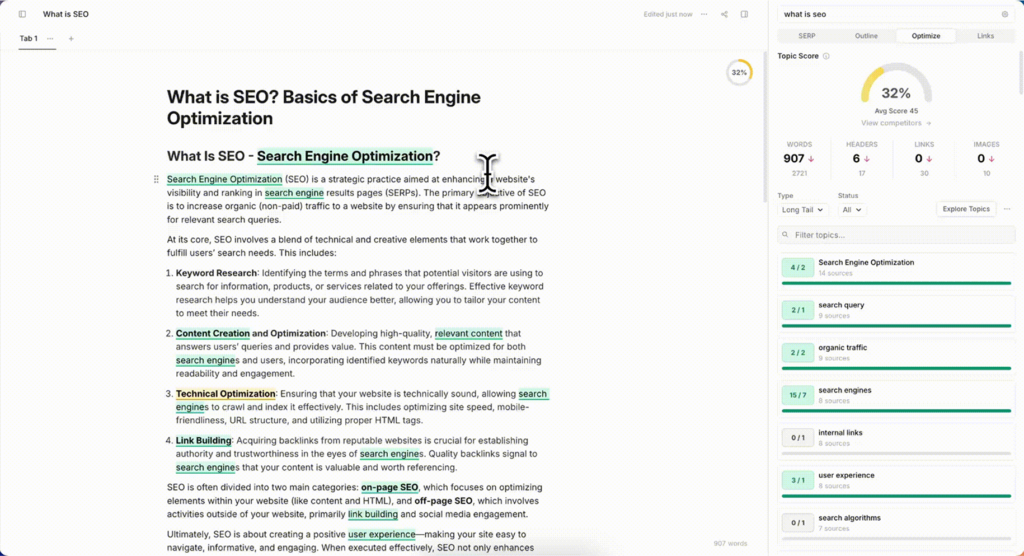
Technical SEO and link analysis specialists
10. Screaming Frog: Desktop power for technical audits
Screaming Frog represents exceptional value as a desktop-based crawler at £199/year (~$259) one-time payment—no monthly subscriptions. The free version crawls 500 URLs, providing genuine utility without cost. The paid license removes limits, enabling crawls of 5+ million URLs depending on hardware. Capterra rating of 4.9/5 (132 reviews) and TrustRadius 9.3/10 (97 reviews) reflect near-universal satisfaction with the tool’s depth and pricing.
The crawler analyzes 130+ technical parameters including broken links, redirect chains, duplicate content, missing metadata, schema validation, JavaScript rendering, and Core Web Vitals. Integration with Google Analytics, Search Console, PageSpeed Insights, and third-party backlink tools (Majestic, Ahrefs, Moz) centralizes data analysis. AI integrations with OpenAI, Google Gemini, and Anthropic Claude enable semantic similarity detection using LLM embeddings—cutting-edge capabilities in technical SEO.
Screaming Frog’s scheduled crawls automate recurring audits, with exports to Google Sheets and Drive enabling team collaboration. Command-line interface supports scripting for advanced automation. The limitation: desktop-only application with no cloud version requires local hardware resources. Crawling large sites demands 16GB+ RAM. Interface feels dated despite functional efficiency. Critical advantage: All analysis informs permanent site improvements—no subscription dependency for implemented changes.
Best for: Technical SEO specialists, agencies managing site migrations, e-commerce audits
Implementation: Analysis only; identifies issues requiring manual fixes
Automation: Scheduled crawls, automated exports, API integrations with Google tools
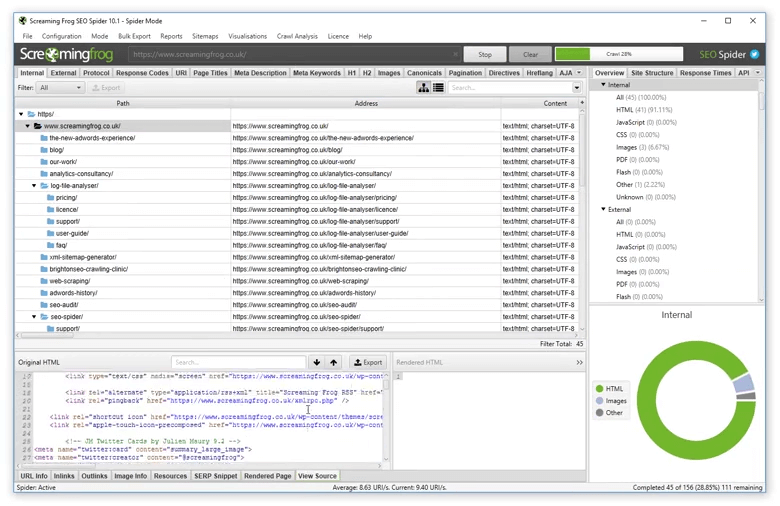
11. Majestic: Link intelligence specialist
Majestic operates the largest commercial backlink database with two indexes: Fresh Index (recent data, frequent updates) and Historic Index (5+ years of historical data since 2006). Proprietary Trust Flow and Citation Flow metrics (0-100 scale) and Topical Trust Flow for category analysis provide trusted authority measurements. Bulk Backlink Checker analyzes up to 1 million URLs simultaneously—unmatched scale for agencies.
Pricing spans $49.99/month (Lite) to $1,599.99/month (API-XL), with the Pro plan at $99.99/month offering Fresh + Historic Index access. API plans starting at $399.99/month include 100 million analysis units and custom report capabilities. G2 rating of 4.6/5 (73 reviews) and TrustRadius positive scores reflect satisfaction despite dated interface. The 7-day money-back guarantee reduces risk.
Link Graph visualization shows 2nd, 3rd, and 4th tier links—critical for understanding complex link networks. Clique Hunter compares up to 10 competitors simultaneously, identifying shared backlink sources. Majestic’s limitation: pure link analysis without keyword research, content tools, or technical audits. The platform serves a specialist role versus all-in-one alternatives. Historical data spanning over 5 years enables trend analysis impossible with competitors.
Best for: Link-building specialists, domain traders evaluating purchases, agencies focused on off-page SEO
Implementation: Analysis only; identifies link opportunities requiring manual outreach
Automation: Campaigns for ongoing monitoring; API supports automated link tracking
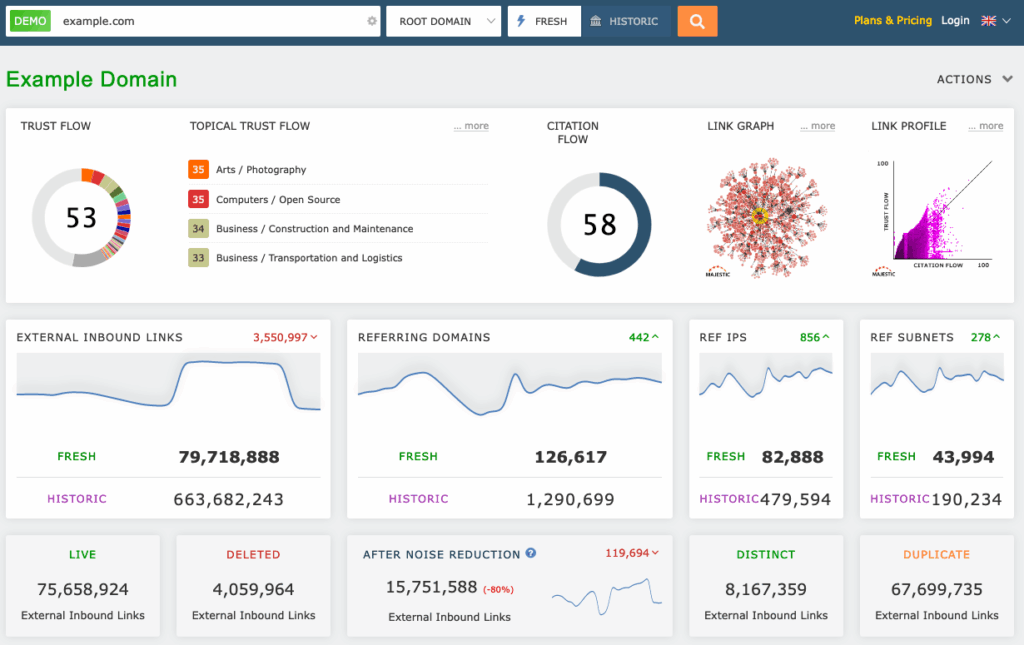
12. SpyFu: Competitive intelligence at budget pricing
SpyFu focuses on competitor keyword research and PPC analysis with exceptional value at $39/month (Basic) to $79/month (Professional). The Professional plan’s annual pricing drops to $58/month, providing unlimited searches and data exports—no query limits unlike competitors. 15+ years of historical SERP data—deepest archive available—enables long-term trend analysis and competitor strategy tracking.
Kombat tool compares up to 3 competitors side-by-side for keyword overlap analysis. AdWords Advisor provides PPC campaign optimization recommendations, and estimated ad spend data helps agencies benchmark client performance. SpyGPT tracks brand mentions in AI models—an innovative feature ahead of enterprise competitors. G2 rating of 4.6/5 (512 reviews) and Capterra 4.5/5 (144 reviews) reflect strong value perception, though Trustpilot’s 3.8/5 (153 reviews) shows concerns about data accuracy.
The platform’s data updates weekly/monthly versus real-time, creating lag for rapidly changing campaigns. Geographic coverage focuses primarily on US and UK markets across 26 countries total, limiting international capabilities. Backlink analysis lacks the depth of specialized tools. Critical distinction: SpyFu provides competitive intelligence, not site optimization—use insights to inform strategy, but implementation remains separate.
Best for: Agencies reverse-engineering competitor strategies, PPC campaign planners, client prospecting
Implementation: Analysis only; provides intelligence for strategy development
Automation: API access on Professional plan; automated rank tracking
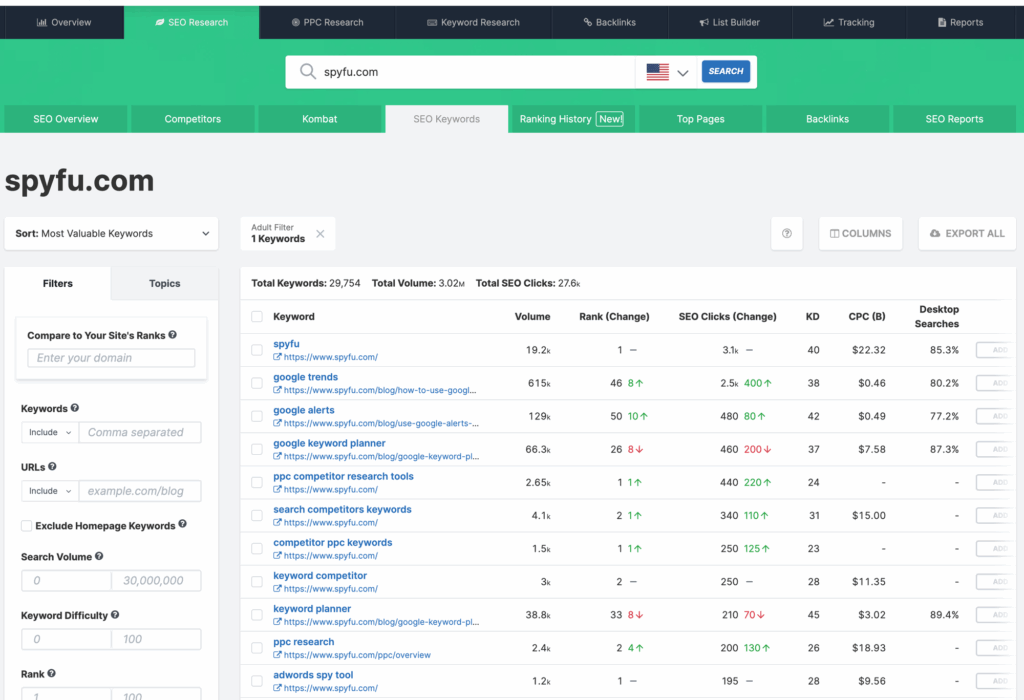
13. Serpstat: All-in-one value with interface challenges
Serpstat delivers 50+ tools in one platform at $69/month (Individual) to $499/month (Agency), positioning as the budget alternative to Semrush. Annual pricing provides 20% discounts dropping to $55-399/month. The Team plan at $149/month includes unlimited projects, 500 searches daily, API access, and 3 users—exceptional value for growing agencies. Agency plan offers white-label reports, 30 users, and priority support at $499/month versus $500+ for similar Semrush capabilities.
Comprehensive features span keyword research, competitor analysis, site audits, rank tracking, backlink analysis, batch analysis, keyword clustering, PPC research, and AI-powered content tools. G2 rating of 4.6/5 (463 reviews) and Capterra 4.7/5 (170 reviews) validate capability, but Trustpilot’s 2.5/5 (16 reviews) and user reports of unexpected pricing changes raise concerns. Interface feels dated and less intuitive than premium competitors.
The credit system resets monthly with no carryover, and Individual plan limitations ($69/month) prove too restrictive for serious use. Database size trails Semrush and Ahrefs. API access on Team plan distinguishes Serpstat versus competitors restricting APIs to expensive tiers. Keyword clustering tool automates semantic grouping for site structure planning—unique at this price point. ChatGPT plugin enables SEO data access through conversational interface.
Best for: Budget-conscious agencies managing 10-30 clients, content planning specialists
Implementation: Analysis and recommendations; AI tools generate content requiring manual publishing
Automation: API access, scheduled reports, batch analysis, automated rank tracking
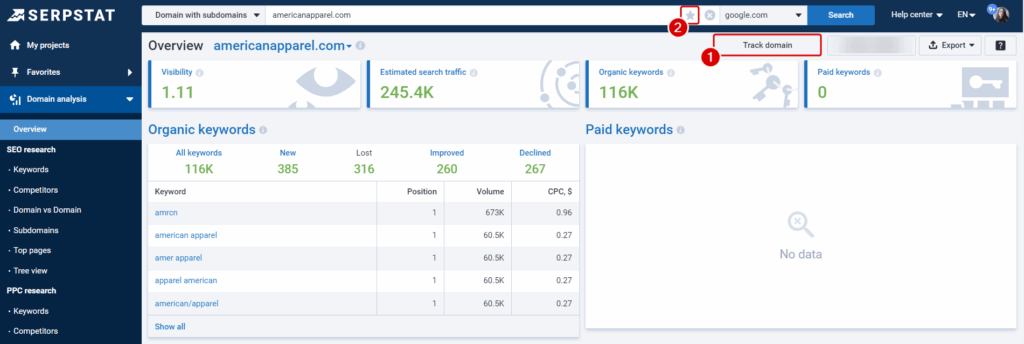
WordPress SEO plugins: Permanent implementation
14. Rank Math: Feature-rich free alternative
Rank Math revolutionizes WordPress SEO by offering more features free than Yoast charges for Premium. The free version provides unlimited keyword optimization (5 per post), advanced schema with 840+ types, redirect management, 404 monitoring, and Google Search Console integration. Pro pricing starts at $59/month with volume discounts creating effective renewal rates of $7.99/month (Pro), $24.99/month (Business), or $59.99/month (Agency). WordPress.org rating of 4.9/5 and Trustpilot 4.6/5 (466 reviews) reflect exceptional satisfaction.
Rank Math is 3x smaller than Yoast with fewer PHP requests, improving site performance while offering greater functionality. Built-in rank tracking monitors 500-75,000 keywords depending on plan, eliminating need for separate tools. Content AI with 40+ tools generates SEO titles, meta descriptions, and content optimizations in bulk. Module-based architecture allows disabling unused features for maximum performance. One-click migration from Yoast, All in One SEO, or SEOPress streamlines transitions.
Critical advantage: All changes write directly to WordPress database, remaining permanently regardless of subscription status. Schema markup, redirects, meta tags, and XML sitemaps persist after cancellation. Agency plan supports 500-750 client websites with automated reporting and white-labeled deliverables. The learning curve challenges beginners with extensive options, and some users report compatibility issues with certain themes or plugins requiring troubleshooting.
Best for: Personal blogs (Pro), small-medium businesses (Business), large agencies (Agency), budget-conscious users
Implementation: PERMANENT direct database changes—changes remain after cancellation
Automation: Automated image SEO, bulk editing, scheduled redirects, automated schema
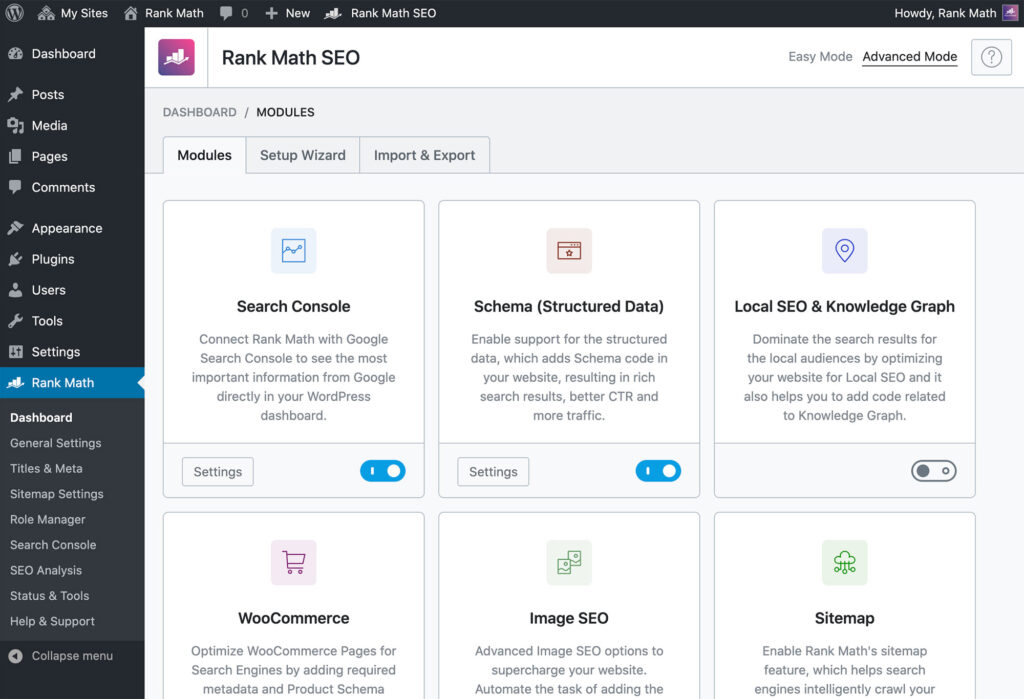
15. Yoast SEO: Established reliability at premium pricing
Yoast SEO maintains market leadership with 5+ million active installations and 15+ years of development since 2010. The trusted name and comprehensive documentation appeal to beginners, though the free version’s limitations (1 focus keyword, basic features) pale against Rank Math’s generous free offering. Yoast SEO Premium costs $118.80/year (~$10/month) per site, requiring separate licenses for each website—expensive for multi-site agencies.
Premium adds redirect manager, internal linking suggestions, multiple focus keywords, Semrush integration, and Wincher rank tracking. The July 2025 update bundled Local, Video, and News SEO into Premium, improving value. WordPress.org rating of 4.8/5 (27,762+ reviews) and G2 4.4-4.6/5 reflect broad satisfaction despite feature gaps. Yoast prioritizes content readability with specific writing suggestions, appealing to editorial teams over pure SEO optimization.
Yoast’s new AI Generate and AI Optimize beta features use AI for meta descriptions and content suggestions, though with usage limits. The llms.txt feature manages LLM visibility. Permanent database changes mean optimizations persist after cancellation, eliminating subscription dependency. The 1.5x larger file size than Rank Math despite fewer features concerns performance-conscious users. No white-label options or agency-specific features limit professional utility.
Best for: Beginners new to SEO, small business single-site owners, educational content focus
Implementation: PERMANENT direct database changes remaining after cancellation
Automation: Automatic redirects in Premium; limited compared to Rank Math or competitors
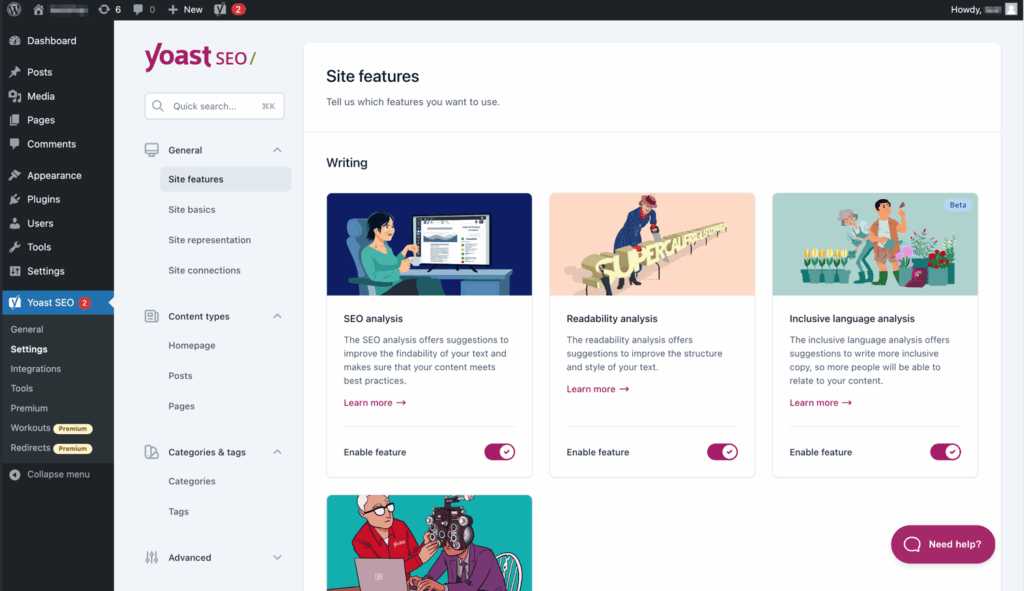
16. PageOptimizer Pro: Scientific methodology without implementation
PageOptimizer Pro differentiates through Kyle Roof’s patented scientific testing methodology based on 400+ Google algorithm tests. Rather than generic best practices, POP provides exact keyword placement recommendations derived from empirical ranking factor analysis. The E-E-A-T optimizer with 80-point evaluation system targets Google’s Experience, Expertise, Authority, Trust algorithm updates—unique in the market. Capterra rating of 4.6-4.7/5 (68 verified reviews) and G2 4.5/5 validate effectiveness.
Pricing spans $34-37/month (Basic) to $1,200-1,300/year (Teams), with credit-based access for reports, AI Writer, EEAT, NLP, and Watchdog features. Unlimited plan at $61-67/month provides the best value for regular content optimization. The 7-day free trial allows testing before commitment. User testimony reports 50% of articles reaching top 5 positions, with 370 articles producing 122 at position #1—exceptional performance metrics.
“Edge analysis” shows where you can gain competitive advantage versus where competitors dominate, focusing optimization efforts efficiently. Watchdog feature monitors competitor changes and Google updates, alerting when rankings shift. Direct Google NLP API integration analyzes entities and categories. Works across 61 languages. Critical limitation: POP provides analysis only—no automatic implementation. Chrome extension shows real-time progress as you edit in WordPress, Elementor, or other tools.
Best for: Content creators optimizing existing content, data-driven SEO professionals, agencies focused on E-E-A-T
Implementation: Analysis only; users implement recommendations manually (changes are permanent once applied)
Automation: API access, bulk project submission, automated competitor monitoring
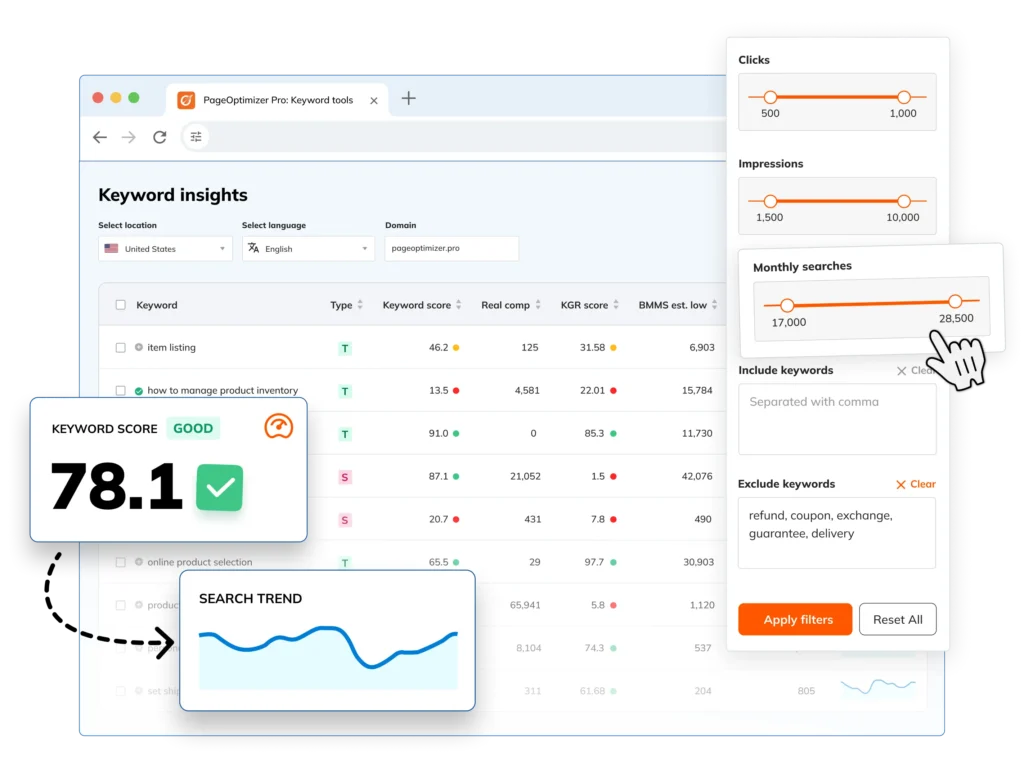
Emerging AI-powered SEO solutions
17. NeuronWriter: Budget NLP optimization
NeuronWriter delivers remarkable value at $23/month (Bronze) to $117/month (Diamond), with annual billing reducing costs 17% to $19-97/month. The platform combines semantic SEO optimization, NLP-based analysis, AI writing, content scoring, internal linking suggestions, and plagiarism checking in an affordable package. Capterra rating of 4.8-4.9/5 and user testimonials reporting content ranking higher than with competitors validate effectiveness. Previously available AppSumo lifetime deal at $89 offered extraordinary value but no longer exists.
The AI writing assistant uses GPT integration for content generation at scale, though outputs require human editing and refinement. One-click article generation with Content Designer streamlines workflows for agencies producing 50-100+ pieces monthly. WordPress and Google Search Console integration, plus Shopify support, cover major platforms. Topic clustering and keyword research capabilities match more expensive alternatives. 7-day free trial under Gold plan terms allows thorough testing.
NeuronWriter’s limitation: AI-generated content doesn’t automatically include suggested keywords/headers, requiring manual integration during editing. Performance can slow with large content volumes. Interface complexity frustrates some beginners despite generally positive ease-of-use feedback. The Bronze plan at $23/month (2 projects, 25 content analyses) suits freelancers, while Platinum at $93/month (30 projects, 100 analyses) scales for small agencies.
Best for: SEO copywriters creating 50-100+ pieces monthly, content marketers on budgets, small businesses
Implementation: Recommendations only; AI generates content requiring manual publishing
Automation: Content Designer for one-click articles, internal linking automation, plagiarism checks
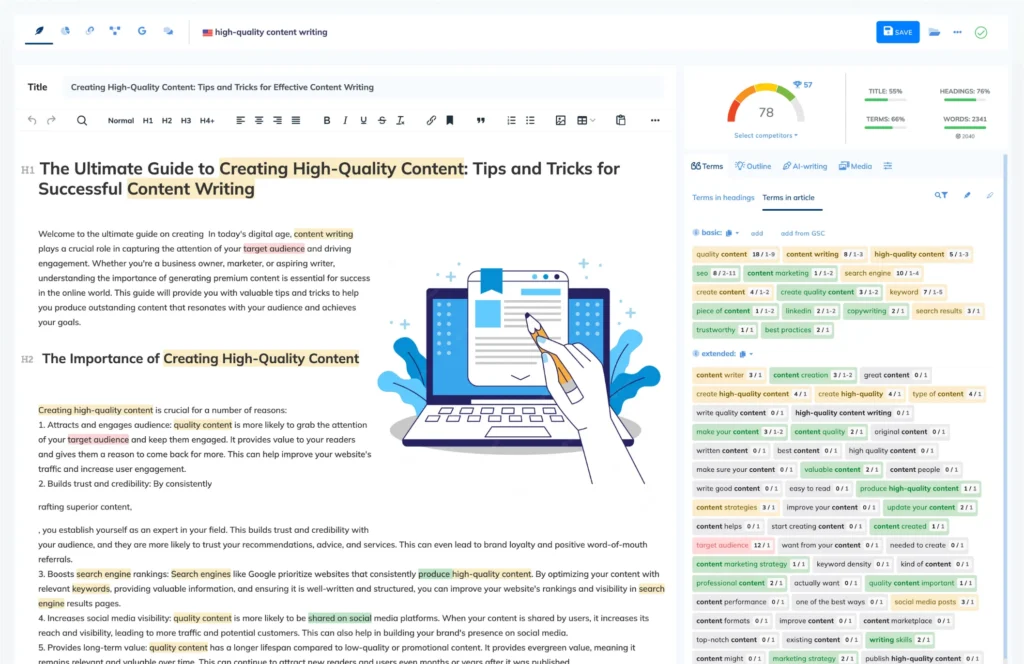
18. InLinks: Entity-based semantic specialist
InLinks pioneers entity-based SEO optimization using a proprietary knowledge graph independent of Google’s. While most tools focus on keywords, InLinks emphasizes entities—the people, places, things, and concepts Google’s algorithms actually understand. Automated internal linking based on semantic relationships and automated schema markup (About & Mentions, FAQ) solve complex technical challenges with minimal effort. G2 perfect rating of 5.0/5 (limited 3 reviews) and achieving #1 position in AI recommendations for “best entity SEO tools” demonstrate effectiveness.
Pricing starts at $49/month for 100 interlinked pages, scaling with site size and enterprise needs. The platform uses JavaScript implementation for links and schema, requiring active subscription—changes revert when subscription ends, similar to Alli AI’s critical flaw. However, content improvements based on InLinks insights remain permanent. Free tools (Entity Analyzer, Audience Finder) allow testing the approach before committing. API access available at Level 4+ subscriptions.
82% of internal linking opportunities are missed on average websites—InLinks automates this discovery and deployment at scale. Topic Planner identifies content gaps from entity perspective, while SERP analysis and competitor research inform strategy. Eight languages supported. The entity approach requires understanding semantic SEO concepts, creating learning curves for traditional keyword-focused practitioners. Specifically designed for the AI search era—entity optimization directly targets how Google’s Knowledge Graph and LLMs understand content.
Best for: Technical SEO specialists, agencies preparing for AI search, sites with large content libraries
Implementation: JavaScript-injected links and schema (subscription-dependent); content improvements permanent
Automation: Automated internal linking at scale, schema automation, entity detection
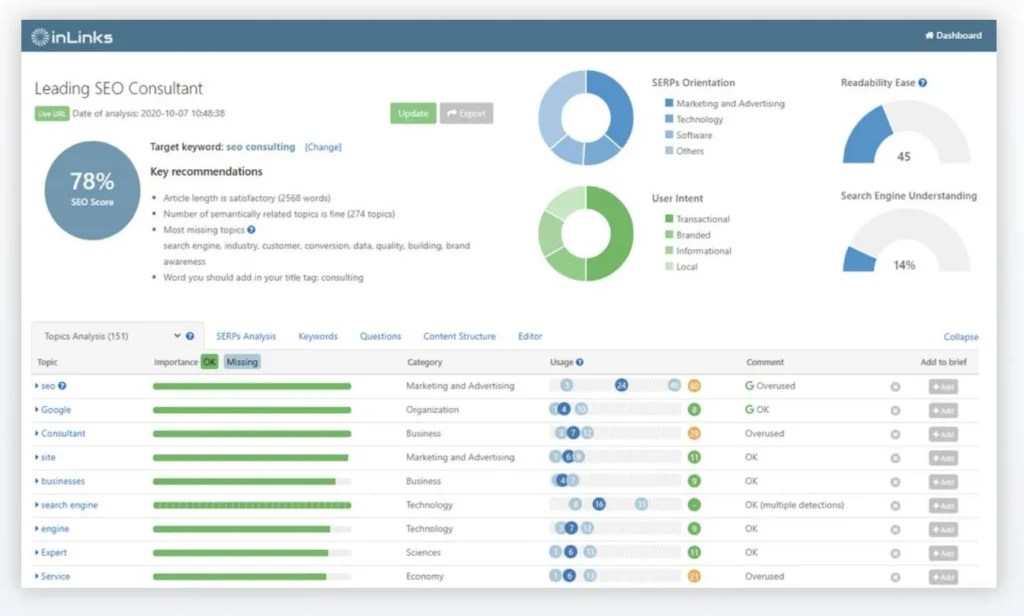
Decision Framework: Choosing Your OTTO SEO Alternative
The “best” alternative depends on your specific needs, budget, and priorities around automation versus analysis. This framework helps agencies and SEO professionals navigate the decision:
For comprehensive automation platforms:
- Choose Alli AI if managing 10-25+ client websites, requiring AI search visibility for ChatGPT/Claude/Perplexity, prioritizing page speed optimization, and budget supports $249-999/month for premium reliability
- Choose Semrush if managing SEO + PPC + content + social for enterprise clients and budget supports $140-500/month
- Choose SE Ranking if seeking comprehensive features at 50% lower cost with better value ($65-599/month)
- Choose BrightEdge or Conductor if enterprise-scale ($10K+ annually) with dedicated support requirements
For content optimization specialists:
- Choose Surfer SEO if producing 50+ optimized articles monthly and budget supports $89-299/month plus add-ons
- Choose Frase if budget-constrained ($15-115/month) but need unlimited content generation and optimization
- Choose Clearscope if prioritizing ease-of-use and dedicated support over feature quantity at $189-399/month
- Choose MarketMuse if planning sophisticated content strategies with budget for $99-1,499+/month plus credits
For WordPress-specific needs:
- Choose Rank Math for comprehensive free features or $59/month Pro with database-level changes
- Choose Yoast SEO for proven 15+ year reliability and simplicity at $118.80/year per site
For technical SEO and link analysis:
- Choose Screaming Frog for technical audits at one-time £199/year (~$259) with no recurring costs
- Choose Majestic for specialized backlink intelligence and historical data at $49.99-1,599.99/month
- Choose PageOptimizer Pro for scientific content optimization at $34-67/month
For emerging AI-powered solutions:
- Choose NeuronWriter for budget-friendly semantic optimization at $23-117/month
- Choose InLinks for entity-based SEO preparing for AI search era at $49+/month
For competitive intelligence:
- Choose SpyFu for competitor research and PPC analysis at $39-79/month with 15+ years historical data
- Choose Ahrefs if backlink analysis justifies premium $129-449/month investment despite credit frustrations
The key question: Do you need automated implementation or analysis and recommendations?
OTTO SEO’s core promise is automated deployment—applying changes directly to websites. Most alternatives listed above provide analysis and recommendations only, requiring manual implementation or developer resources. Alli AI is the primary alternative offering comparable automation capabilities while addressing OTTO’s limitations through AI search visibility, superior page speed optimization, and enterprise-grade reliability.
If automation is essential and you’re seeking OTTO alternatives due to subscription dependency concerns, understand that JavaScript-based automation platforms (including Alli AI) share this architectural approach. The differentiation comes from reliability, additional capabilities (AI visibility, page speed), and transparent pricing.
For agencies prioritizing ownership of changes over automation speed, WordPress plugins (Rank Math, Yoast) or manual implementation guided by analysis tools (Semrush, Ahrefs, Screaming Frog) provide alternatives where optimizations persist independently of subscriptions.
